Stories about...Biology
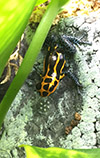 IB Professor Eva Fischer Espouses Frogs—for Both Research and the K–12 Classroom
IB Professor Eva Fischer Espouses Frogs—for Both Research and the K–12 Classroom
“We talk a lot about what we can do at the university level to increase diversity in STEM to reach other populations, etc. But I think if we don't worry about that until kids are 18 and we're at the university level, we've missed the boat. So I just think that we've got to start earlier.” — Eva Fischer
October 7, 2020
There’s a new Integrative Biology professor in town—Eva Fischer—who is sold on frogs. She’s not only setting up a lab in order to research frog behaviors, but she champions their use in the Frogger School Program she’s helped to design for use in K–12 classrooms.
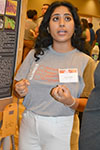 Biomedical Imaging REU Helps Undergrads Make Educated Decisions About Grad School
Biomedical Imaging REU Helps Undergrads Make Educated Decisions About Grad School
August 29, 2019
In its fifth year, the NSF-funded Biomedical Imaging REU brought ten undergraduate students from across the country, even Puerto Rico, to Illinois to expose them to the idea that studying biomedical engineering in graduate school might be a viable direction for their future. Through the REU, they discovered how rewarding research can be, gained poster-making and oral presentation skills, built relationships with peers on a similar career track, and even networked for the future.
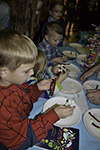 Visitors of All Ages Have Fun With DNA, Genomics at IGB's Genome Day
Visitors of All Ages Have Fun With DNA, Genomics at IGB's Genome Day
November 30, 2017
Genes vs. genomes: it seems that one needs a biology degree to tell the difference. One thing is for sure, however—neither of them are made of denim! Hundreds of people attending this year’s Genome Day, an event sponsored by the Carl R. Woese Institute for Genomic Biology (IGB), learned the difference through many fun and engaging activities supplied by over a hundred Illinois students, staff, and researchers throughout the afternoon of Saturday, November 11th. The purpose of the event? To educate the community, especially K–5th graders, on the topics of genes, genomes, and evolution. Participants could build 3D models of DNA, explore the Tree of Life to figure out how closely different species are related, and even extract strawberry DNA to make flavored candy necklaces.
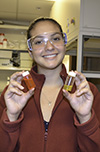 Bioimaging REU Exposes Undergrads to Imaging Research, What Grad School is Like
Bioimaging REU Exposes Undergrads to Imaging Research, What Grad School is Like
July 18, 2017
In its third summer, the Bioimaging Research Experience for Undergraduates (REU) allowed four undergraduate students to experience research on imaging. Not only did they learn about the specific area they were researching; but they acquired new skills related to imaging; gained professional skills, such as how to present their research; plus learned what graduate school is like. For some, it confirmed that graduate school/research was in their future.
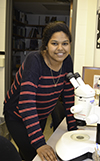 VInTG IGERT Inspires Ph.D. Student Lynette Strickland to Choose a Career in Research
VInTG IGERT Inspires Ph.D. Student Lynette Strickland to Choose a Career in Research
May 2, 2016
How did a little girl who had never been further than her home state of Texas and dreamed of being a veterinarian end up a researcher at Illinois, who also spends large blocks of time in Panama and is passionate about studying, in particular, the colorful Chelymorpha, or tortoise beetle? Lynette Strickland, an Animal Biology Ph.D. student who works in the lab of Illinois researcher Carla Caceres, credits the NSF-funded VInTG (Vertically Integrated Training with Genomics) IGERT.
FULL STORY
MCBees Help Provide Student Support, Recruit, & Share the Joy of Science
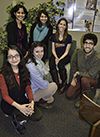
April 26, 2016
In the past, new graduate students coming into Illinois' 10-year-old School of Molecular and Cellular Biology (MCB) didn’t have much interaction with other grad students who had been in MCB for a while. During their first six months at Illinois, they were somewhat isolated as they rotated from lab to lab to find their niche, then got further divided as they entered one of MCB’s four departments: Biochemistry, Cell and Developmental Biology, Microbiology, and Molecular and Integrative Physiology (MIB). Then, once that first semester was done, they didn’t really come into contact with their classmates any more, “because you kind of get busy with your work," admits Biochemistry grad student Amruta Bhate, "and you only meet people from your department."
FULL STORY
Local K–5 Students Learn about DNA and Genomic Research at IGB's Genome Day
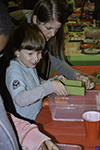
November 30, 2016
Around 500 visitors, both young and old, spent their Saturday afternoon on November 12th at Genome Day, learning more about DNA and genes. Sponsored by the Institute for Genomic Biology (IGB), the event featured fun, engaging, hands-on activities taught by 120+ Illinois students, staff, and researchers associated with IGB who were on hand at the Orpheum Children’s Science Museum, where they shared their passion for genomics and introduced the visitors to the world of IGB's research.
FULL STORY
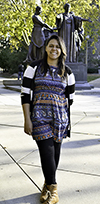 Rodriguez-Otero Says SROP Puts a Face With an Application, Fosters Relationships
Rodriguez-Otero Says SROP Puts a Face With an Application, Fosters Relationships
November 10, 2015
So how did Molecular and Cellular Biology (MCB) grad student Jannette Rodriguez-Otero from San Juan, Puerto Rico, go from studying to be a barber in a local vocational school to working on a Ph.D. in molecular sciences in MCB's Cellular Developmental Biology Department? She claims that there’s one reason she’s at Illinois: SROP.
FULL STORY
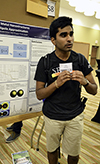 REU Undergrads Experience Research, What Graduate School Is Like
REU Undergrads Experience Research, What Graduate School Is Like
August 25, 2015
Twenty-six undergrads helped with cutting-edge research at Illinois this past summer as part of three NSF-funded Research Experience for Undergraduates (REU) programs: the nano@illinois, EBICS, and Bioimaging REUs. In addition to the research experience itself, as a side benefit, participants got to find out what being a graduate student is like and possibly decide if research—particularly the area they were studying this summer—might be the career for them.
FULL STORY
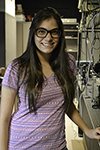 Summer Research Experience Exposes Undergrads to Bioimaging at Illinois
Summer Research Experience Exposes Undergrads to Bioimaging at Illinois
August 24, 2015
One goal of the NSF-funded Bioengineering REU (Research Experience for Undergraduates) was that students who participated this summer would consider going to graduate school, and hopefully in bioimaging—and it appears they might have achieved that goal. The ten undergrads who participated in the REU not only performed cutting-edge bioimaging research; they also found out what grad school is like, and some even decided that the area they researched this summer might be the career for them—and that Illinois is the place to prepare for it.
FULL STORY
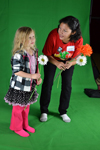 IGB's Genome Day Exposes Visitors to Genomic Research
IGB's Genome Day Exposes Visitors to Genomic Research
November 13, 2013
From watching themselves dance with plants on a video screen, to using a ProScope to examine coral and fossils, to measuring the temperature of a "Yellowstone National Park hot spring," around 500 area youngsters (and their parents) who attended Genome Day on Saturday, November 2, 2013, got to learn a whole lot about genomics.
FULL STORY
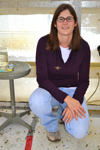 VINTG IGERT Students Receive Outside-of-the-Box Training in Genomics
VINTG IGERT Students Receive Outside-of-the-Box Training in Genomics
November 11, 2012
Nine new doctoral students arrived on campus this fall to receive a new kind of training in genomics that "thinks outside the box." The premise of this training model: to produce a new generation of biologists on the cutting edge of genome-enabled science, who can specifically address how genomes interact with the environment to create diversity.
FULL STORY
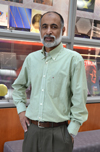 The Face of Nanotechnology at Illinois, CNST Promotes Interdisciplinary Collaboration
The Face of Nanotechnology at Illinois, CNST Promotes Interdisciplinary Collaboration
September 14, 2012
Illinois' Center for Nanoscale Science and Technology (CNST) works to provide training and to foster collaboration in nanotechnology at the intersection of engineering and biology. Why should engineers need to learn about biology? According to Irfan Ahmad, Executive Director of CNST, the national academies have identified the 21st century as the century of biology.
FULL STORY
 S-STEM Grant to Provide Scholarships for Biology, Chemistry, & Math Merit Students
S-STEM Grant to Provide Scholarships for Biology, Chemistry, & Math Merit Students
July 2, 2012
She wants to study chemistry at Illinois. She's familiar with the university because her mom went to school here. But because she lives out of state, it's too expensive. So instead, she's been going to a local college. However, she's been quite discouraged, because she wants to come to Illinois.
FULL STORY
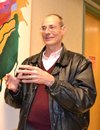 IGERT Trains Students at the Intersection of Neuroscience and Engineering
IGERT Trains Students at the Intersection of Neuroscience and Engineering
"We're trying to develop a culture and a community of people here on campus that are interested in the intersection of neuroscience and engineering."
According to program coordinator Pat Grenda, this is the goal of the Neuroengineering IGERT at Illinois. Short for "Neuroengineering: A Unified Educational Program for Systems Engineering in Neuroscience," the five-year Ph.D. program is funded by a National Science Foundation Integrative Graduate Education and Research Traineeship (IGERT) grant. In its fourth year, the IGERT currently has 45 students enrolled in four cohorts.
FULL STORY
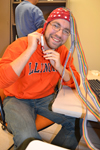 Neuroengineering IGERT Students Experience Interdisciplinary Research
Neuroengineering IGERT Students Experience Interdisciplinary Research
One student wants to discover how the brain enables complex thought, such as philosophy. Another wants a field rewarding enough to get him out of bed and to work every morning. Another student, who heard about the IGERT program while jogging, finds the psychology-engineering intersection intriguing and the engineering tools crucial to his work. Still another saw the IGERT as an opportunity to acquire resources, knowledge, and connections in the field of engineering that she wouldn't have had otherwise. No matter why students chose the Neuroengineering IGERT at Illinois, they find interdisciplinary research at the intersection of neuroscience and engineering to be challenging, yet exciting.
FULL STORY













.jpg)
















